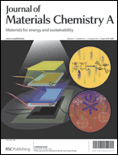
Journal of Materials Chemistry A
Scope & Guideline
Transforming Ideas into Sustainable Materials and Energy Solutions
Introduction
Aims and Scopes
- Energy Materials:
Research related to the development and optimization of materials used in energy storage and conversion systems, including batteries, supercapacitors, and fuel cells. - Photocatalysis and CO<sub>2</sub> Utilization:
Studies focused on materials and systems that capture and convert CO<sub>2</sub> into useful products, utilizing light-driven processes and photocatalytic mechanisms. - Nanomaterials and Nanostructures:
Exploration of nanostructured materials for enhancing performance in various applications, including sensors, catalysts, and electronic devices. - Electrocatalysis:
Investigation of materials that promote electrochemical reactions, particularly those related to hydrogen evolution, oxygen reduction, and nitrogen fixation. - Sustainable and Green Materials:
Development of environmentally friendly materials, including biodegradable polymers, and strategies for recycling and reusing materials. - Interface Engineering:
Research into the design and modification of material interfaces to improve performance in energy devices and catalysis. - Machine Learning in Materials Science:
Application of machine learning techniques to predict material properties, optimize synthesis processes, and enhance materials discovery.
Trending and Emerging
- Flexible and Wearable Electronics:
Research in flexible electronics has gained momentum, focusing on materials that can be integrated into wearable devices, enhancing comfort and functionality. - Solid-State Batteries:
Significant interest in solid-state battery technologies is emerging, driven by the need for safer, more efficient energy storage solutions. - Electrocatalysts for Sustainable Processes:
The development of electrocatalysts for energy conversion and storage, particularly in CO<sub>2</sub> reduction and hydrogen production, is gaining traction. - Advanced Characterization Techniques:
There is an increasing emphasis on sophisticated characterization methods, such as in situ and operando techniques, to better understand material behavior under real-world conditions. - Machine Learning and AI in Materials Discovery:
The integration of machine learning and artificial intelligence in materials discovery is trending, facilitating the rapid identification and optimization of new materials. - CO<sub>2</sub> Utilization and Carbon Capture:
Research focusing on innovative materials for CO<sub>2</sub> capture and conversion into value-added products is increasingly prominent. - Multifunctional Materials:
The trend towards developing multifunctional materials that serve multiple purposes in energy and environmental applications is gaining traction.
Declining or Waning
- Conventional Organic Photovoltaics:
Research on traditional organic photovoltaic materials has seen a decrease as newer technologies and materials, such as non-fullerene organic solar cells, gain prominence. - Legacy Battery Technologies:
Focus on older battery technologies, such as lead-acid batteries, has diminished in favor of advanced lithium-ion and emerging battery systems. - Basic Synthesis Methods:
There is a waning interest in conventional synthesis methods without innovative modifications, as the field shifts towards more complex and tailored approaches. - Single-Use Materials:
Research on materials designed for single-use applications is declining as sustainability and recyclability become more critical in materials development. - Passive Materials:
The focus on entirely passive materials with limited functionality is decreasing, as there is an increasing demand for multifunctional and responsive materials.
Similar Journals
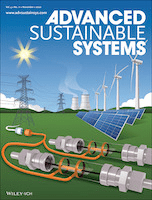
Advanced Sustainable Systems
Driving Change Through Groundbreaking ResearchAdvanced Sustainable Systems is a premier academic journal published by WILEY-V C H VERLAG GMBH, dedicated to the dynamic fields of environmental science and renewable energy. With an ISSN of 2366-7486, this journal has rapidly established its significance within the scientific community, achieving a prestigious Q1 ranking in both Environmental Science (miscellaneous) and Renewable Energy, Sustainability and the Environment categories as of 2023. Spanning the converged years from 2017 to 2024, it serves as a vital platform for researchers and practitioners alike, facilitating the dissemination of innovative ideas and groundbreaking research that drive sustainability initiatives globally. Although not an Open Access publication, its contributions are invaluable, reflected by its commendable Scopus rankings—#28 out of 233 in General Environmental Science and #49 out of 270 in Renewable Energy. As we face pressing environmental challenges, Advanced Sustainable Systems remains at the forefront, championing research that informs and influences sustainable practices and policies across the globe.
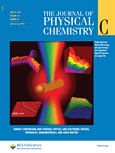
Journal of Physical Chemistry C
Exploring the intersection of theory and application.The Journal of Physical Chemistry C, published by the American Chemical Society, stands as a pivotal resource in the realm of materials science and physical chemistry. With an impact factor reflecting its esteemed reputation, this journal showcases high-quality research spanning topics such as electronic, optical, and magnetic materials, as well as nanoscience and nanotechnology. Hailing from the United States, it operates without an open access model, yet its contributions are critical for advancing our understanding of surfaces, coatings, and films. Notably, the journal is classified in Quartile 1 (Q1) for several categories, underscoring its prominence in Physical and Theoretical Chemistry and related fields. Researchers, professionals, and students alike will find value in the comprehensive discussions and innovative research trends presented. The scholarly articles published from 2007 to 2024 not only drive forward scientific inquiry but also inform practical applications in various industries, making this journal an essential tool for anyone committed to excellence in the sciences.
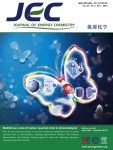
Journal of Energy Chemistry
Pioneering Discoveries in Energy ChemistryThe Journal of Energy Chemistry, published by Elsevier, is a premier international journal that has established itself at the forefront of research in the fields of electrochemistry and energy technology. With an impressive impact factor, this journal is classified in the Q1 quartile across multiple categories including Energy Engineering and Power Technology, Fuel Technology, and Electrochemistry, underscoring its significant contribution to advancing knowledge and innovation in energy systems. Based in the Netherlands, the journal offers open access to its cutting-edge research, allowing for broad dissemination and engagement among researchers, professionals, and students alike. The scope of the journal spans crucial topics from chemical energy storage to sustainable energy solutions, making it an essential resource for those looking to understand and contribute to the evolving landscape of energy chemistry.

Green Energy & Environment
Fostering Global Collaboration for a Sustainable Future.Green Energy & Environment, published by KEAI PUBLISHING LTD, stands as a pioneering journal dedicated to the dynamic fields of renewable energy, sustainability, and environmental science. With its ISSN 2096-2797 and E-ISSN 2468-0257, this Q1 journal holds a noteworthy presence in academic discourse, reflecting its high-quality contributions within these critical areas of research. Launched in 2016, it has consistently embraced an Open Access model, facilitating unhindered access to research findings and fostering collaboration across global communities. Based in Beijing, China, this journal is dedicated to disseminating innovative insights that are essential for addressing urgent global challenges related to energy and environmental sustainability. Researchers, professionals, and students alike benefit from a platform that not only showcases pioneering research but also encourages interdisciplinary dialogue and knowledge exchange in the pursuit of a sustainable future.

Energy Material Advances
Driving Progress in Fuel Technology and SustainabilityEnergy Material Advances, published by the American Association for the Advancement of Science, stands at the forefront of energy research, showcasing groundbreaking studies in the realm of renewable energy, fuel technology, and materials science. With the journal's commitment to open access since 2020, it aims to democratize knowledge and foster innovation across a global community of researchers, professionals, and students. The journal boasts an impressive impact factor, placing it firmly within the Q1 category across multiple disciplines including Energy (miscellaneous), Fuel Technology, and Renewable Energy, Sustainability and the Environment, highlighting its significance in advancing scholarly discussions. In the latest Scopus rankings, Energy Material Advances ranks among the top 10% of journals in its field, affirming its role as a pivotal resource for current and emerging trends in energy materials. The journal is dedicated to facilitating collaborative efforts and inspiring novel approaches to the challenges posed by energy sustainability and technological advancement.
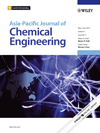
Asia-Pacific Journal of Chemical Engineering
Exploring Cutting-Edge Research in Chemical Engineering and Beyond.The Asia-Pacific Journal of Chemical Engineering, published by WILEY, serves as a vital forum for the dissemination of innovative research in the interdisciplinary domains of chemical engineering, renewable energy, sustainability, and waste management. Established in 2006, this esteemed journal has achieved a notable impact factor that reflects its commitment to advancing knowledge and practices within the chemical engineering community. With its Q3 category rankings across various fields, including Chemical Engineering (Miscellaneous), Renewable Energy, Sustainability and the Environment, and Waste Management and Disposal, the journal holds a significant position among its peers, assuring readers of quality and relevance in published content. Although it does not offer Open Access options, the Asia-Pacific Journal of Chemical Engineering remains an essential resource for researchers, professionals, and students aiming to stay at the forefront of innovations affecting the Asia-Pacific region and beyond. The journal's broad scope covers diverse topics, making it an integral part of the academic landscape from 2006 to 2024.
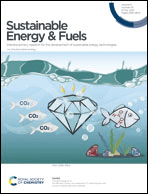
Sustainable Energy & Fuels
Shaping Tomorrow's Energy Landscape TodaySustainable Energy & Fuels is a leading journal published by the Royal Society of Chemistry, dedicated to advancing knowledge in the fields of energy engineering, fuel technology, and renewable energy solutions. With its ISSN of 2398-4902 and notable Q1 status in both Energy Engineering and Power Technology as well as Fuel Technology, this journal ranks impressively in the Scopus database, ensuring a strong platform for disseminating impactful research. The journal spans a comprehensive scope aimed at addressing the global challenges of sustainable energy, including innovative methodologies and technologies that promote environmental sustainability. Although it operates under a traditional access model, the journal is committed to providing high-quality content that engages researchers, professionals, and students alike. With significant contributions expected through 2024, Sustainable Energy & Fuels stands at the forefront of facilitating scholarly communication, inspiring advancements in energy technologies that align with sustainability goals.
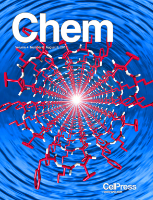
Chem
Leading the Charge in Open Access Chemical ResearchChem, published by CELL PRESS, is a renowned academic journal that has rapidly established itself as a leading platform for cutting-edge research in diverse areas such as biochemistry, chemical engineering, materials chemistry, and environmental chemistry. Released under the ISSN 2451-9294, this esteemed journal has achieved an impressive Q1 category ranking across multiple disciplines in 2023, highlighting its significant impact and prominence within the academic community. With a strong focus on innovative studies and interdisciplinary approaches, Chem fosters a vibrant dialogue among researchers, professionals, and students, making it an indispensable resource for those seeking to advance their knowledge and contribute to the evolving field of chemistry. As an open access journal, it aims to democratize knowledge, ensuring that critical research is accessible to a global audience. With its headquarters based in Cambridge, MA, it continues to lead the charge in the dissemination of pivotal findings that shape our understanding of chemical sciences.
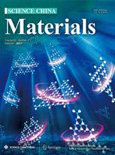
Science China-Materials
Innovating Tomorrow's Materials, Today.Science China-Materials is an esteemed peer-reviewed journal dedicated to advancing the field of materials science, published by SCIENCE PRESS. With a strong focus on innovative research and applications, this journal provides an essential platform for disseminating groundbreaking findings in materials development, characterization, and engineering. Since its inception, Science China-Materials has achieved an impressive Q1 ranking in the Materials Science (miscellaneous) category, reflecting its commitment to quality and the impact of its publications, as indicated by its 86th percentile ranking in Scopus. The journal is set to converge its contributions from 2016 to 2024, making it a vital resource for researchers and professionals interested in the latest advancements and trends in materials science. As an open access publication, it ensures that knowledge is freely available to a global audience, promoting collaboration and innovation across disciplines. The journal is headquartered in Beijing, China, and continues to attract high-quality submissions from leading experts in the field.

Science China-Chemistry
Empowering Chemists with Cutting-Edge DiscoveriesScience China-Chemistry, published by SCIENCE PRESS, stands as a leading journal in the field of chemistry, specifically recognized for its contributions in miscellaneous chemistry domains. With an impressive Q1 categorization in the 2023 quartiles and ranking at #35/408 in general chemistry by Scopus, this journal places itself within the top 91st percentile, showcasing its significant impact in the discipline. The journal, based in Beijing, China, provides a platform for innovative research, reviews, and insights that cater to an international audience of researchers, professionals, and students dedicated to advancing chemical science. As an open-access journal, it ensures widespread dissemination of knowledge, making cutting-edge research accessible to all. With converged years from 2010 to 2024, the journal continues to be a vital resource for those engaged with the latest developments in chemistry.